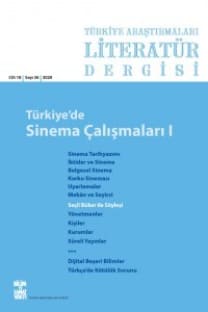II. Meşrutiyet'ten Cumhuriyet'e Türk Romanında Yeni Açılımlar
Roman, özellikle toplumsal ve siyasal kargaşanın arttığı, değerlerin alt-üst edildiği çöküş dönemlerinde, sosyal işlevi bakımından aslî fonksiyonunun önüne geçer ve daha aktif bir rol üstlenir. Bu özellikleri gösteren II. Meşrutiyet Dönemi Romanı, eser-okur ilişkisi, konu, olay örgüsü ve daha çok yapı bakımından kendinden önceki ve sonrakilerden ayrılır. Ana hatlarıyla II. Meşrutiyet Dönemi Romanı, açık mesajlı, sosyal ve siyasal olaylara angaje; toplum değerlerinden yönetime, eski-yeni boyutundan Batılılaşma izleğiyle desteklenen Doğu-Batı çatışmasına; değişen değerlere, zihniyet çatışmasına ve nihayet siyasal ve sosyal yapının geleceğe dönük ütopik fantezilerine kadar pek çok çatışmayı bünyesinde taşır. 1908 öncesi dönemin yönetimi aleyhinde gelişmekte olan siyasal çalışmalar, eserlerin çatışmalarını yönlendirir. Buna göre romanlardaki çatışmaların arkasında, belli bir kuşağın bunalımı olduğu kadar, çöküş dönemi yaşayan bir toplumun siyasal, ekonomik ve bilhassa ahlâkî bakımdan çözülüşü vardır. Buna göre yönetimi ve toplumu sorgulamayı hedef alan romanlar, bir yandan Batılılaşma yolundaki Türk toplumunun altı asırdır yaşayageldiği kıymet hükümlerinde görülen bozulma, çözülme ve yozlaşmanın bireysel ve toplumsal planda nerelere gelebildiğini gözler önüne sererken, bir yandan da ülkücü kişileri aracılığıyla, bu çöküş yılları psikolojisi içinde, bir çıkış yolu göstermeyi hedefler. Bütünleyecek olursak, II. Meşrutiyet Dönemi Romanı, bütün acemiliklerine rağmen bir arayışın romanıdır. Bu dönemde yazılan roman/kısa roman/uzun öykülerde gündeme getirilen/çözümlenmeye çalışılan sorunlar ve işlenen izlekler Cumhuriyet kuşağı romancıları tarafından zenginleştirilerek ve derinleştirilerek devam edecektir.
Anahtar Kelimeler:
Roman, Popüler Roman, II. Meşrutiyet Dönemi, Batılılaşma, Geleneksel Roman
New Openings in the Turkish Novel from the Second Constitutional Era to the Republic
Novel attains a function far from its traditional features in times of increased social and political conflict and the regression of values. As such, its social function outgrows its essential aim. The novel of the Second Constitutional Era, exhibiting these features, is unique in terms of its novel-reader relations, plot, subject matter and especially structure. In general, the novel of the Second Constitutional Era has an open message, is engaged in the social and political events, and it is imbued with many conflicts from social values to administration, from the conflict between the old-new to the clash between the East-West propelled by westernization, from transforming values to the conflict of mentality and finally to the utopian fantasies of the political and social structures. The political activities developing against the administration before 1908 direct the conflicts in novels. Accordingly, there is both the depression of a certain generation and the political, economic and moral disintegration of a society behind these conflicts. In this regard, novels that aim to question the administration and society, on one hand, try to reflect the corruption in the traditional values of the Turkish society on its way to westernization and the extent this disintegration has reached on an individual and social level. On the other hand, they seek a way out of this corruption through the depiction of their idealistic characters. In conclusion, the novel of the Second Constitutional Era is the novel of a search despite its technical deficiencies. The subjects studied in the novels/short novels/long stories of this period would later be continued by the novelists of the Republican period in both a richer and a more detailed way.
Keywords:
Novel, Popular Novel, Second Constitution, Westernization, Traditional Novel,
- ISSN: 1303-9369
- Başlangıç: 2003
- Yayıncı: Bilim ve Sanat Vakfı
Sayıdaki Diğer Makaleler
Türk Edebiyat›nda “Edebî Röportaj”
Bir Edebiyat Disiplini Kurucusu: Mehmet Kaplan
II. Meşrutiyet'ten Cumhuriyet'e Türk Romanında Yeni Açılımlar
İstanbul Üniversitesi Türkiyat Enstitüsü
Tanzimat'tan II. Meşrutiyet'e Türk Romanı
Türkiye'de Edebiyat Sosyolojisi Çalışmaları
Türk Edebiyatında Deneme Literatürü
Türk Edebiyatında Roman: Cumhuriyet Devri
Abdülhalim Memduh'tan Ahmet Hamdi Tanpınar'a Edebiyat Tarihlerinde Yenileşmenin Sınırları
